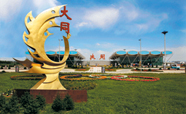Public lectures on Datong city history and culture
The Pingcheng Lecture Room is a cultural event designed to enrich residents' lives in Datong, Northern China's Shanxi province, with a variety of educational talks. Lecture topics range from culture and history to tourism and military affairs. The lecture series is named after the historical name of Datong city, Pingcheng, to show its goal of preserving culture and traditions in the city.
There will be two public lectures in August. One is an analysis of a classical Chinese literary work on Aug 8. The other focuses on Pingcheng as the capital of the Northern Wei Dynasty (AD 386-534) on Aug 24 by Cao Jie, a renowned Datong writer.
Cao has studied the history of the Northern Wei Dynasty for many years. He will give a detailed description of Datong the way it was over 1,600 years ago, when the city was a world-class metropolis and the capital of trade, business and Buddhism in China. He will analyze Pingcheng's features, the construction style of its temples, its robust economy and the profound impact it had on Chinese history. The facts in Cao's lecture are based on his studies of ancient documents and archaeological work in Northern Wei Dynasty sites.
The Datong City Library hosts a free public lecture every other week. Apart from lectures, the library boasts a cozy reading environment and advanced facilities. It also hosts an e-reading room, multifunctional lecture hall and storage space holding over 3,000 books. The library has held nearly 300 public lectures to date.
Copyright 1995 - 2010 . All rights reserved. The content (including but not limited to text, photo, multimedia information, etc) published in this site belongs to China Daily Information Co (CDIC). Without written authorization from CDIC, such content shall not be republished or used in any form. Note: Browsers with 1024*768 or higher resolution are suggested for this site.

